Astrocards - a game I made to help me memorize Italian Vocabulary
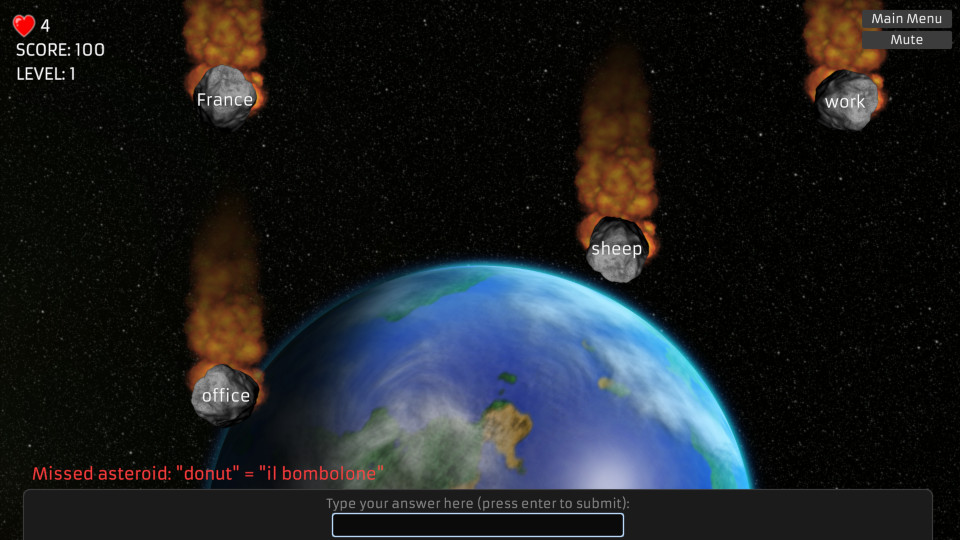
A screenshot of an asteroids game.
So over the past couple of weeks I have been working on a small project called
Astrocards and I figured it would be interesting to write up my little
adventure in creating it and my thoughts on it.
Motivation
My main motivation for creating this project was that around Spring Break I wanted to learn some basic Italian but the main roadblock that I encountered was that I needed to memorize a decent bit of vocabulary if I wanted to speak or write. This could be somewhat of a tedious process and I wanted to make it more engaging. I could sign up for one of the flashcard studying websites such as Quizlet but I didn’t want to create an account for any of those services so I decided it would be more interesting to write my own study app as a little programming challenge/project.
The main inspiration for Astrocards was that there used to be a game on Quizlet called “Asteroids” and the basic idea was that various asteroids would fall down the screen and they would be labelled with terms/questions from the flashcard set you were studying and you had to type the answer corresponding with the label to destroy the asteroid. I thought it was a somewhat fun game and I remember playing it in middle school to earn as high of a score as possible. Unfortunately, last time I checked, I think Quizlet deleted the game or something and the other games aren’t quite the same. Therefore, I decided it would be fun to resurrect the game in my own vision and use it for my own study purposes.
Astrocards Development
I initially had kind of a rough start to the project. Since I wanted to support
Italian, I needed a game framework that would support being able to type
accents (characters such as áéíóúàèìòù etc.). I also decided that I wanted to
program this app in Rust. I first tried to use macroqaud
and while it went okay for a bit, I then realized that I did not have an easy
way to implement typing accents in it. I also tried ggez
but that didn’t really work out either. Eventually I just settled on peicing
together my own framework using glfw (which did have support for typing
accents and other characters) for the window management, OpenGL for the graphics,
and egui for the GUI. It wasn’t too bad though since I just reused a lot of
code that I have been using for Voxelworld.
After some effort, I was able to implement the asteroids game and I likely spent
a little too much time making the graphics look pretty (implementing a fire trail
for the asteroids and also adding an explosion effect, both of which I really
like by the way). I also added sound effects (which I downloaded from
opengameart, in fact, I pretty much downloaded all
of the artwork from opengameart - so a huge thanks
to the artists that make their work available for others to use in such a way).
You can find the credits for the artwork that I used in assets/credits.txt
for Astrocards.
Additionally, I would later decide to implement a “learn” mode in which you can go through the list of flashcards. You start out with multiple choice questions but it then goes to free response where you have to type your answer in order to hopefully introudce the terms and then get you to better memorize them later.
How to Play Astrocards
The idea behind Astrocards is quite simple: you have to protect a planet from being destroyed by asteroids. You start with five hitpoints and once you lose all of them, you lose and get a game over screen. You can destroy asteroids by typing the answer to the question that they are labelled with and get points. Once you have destroyed enough asteroids you will level up and asteroids will spawn more frequently and move faster.
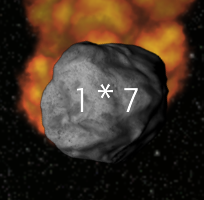
An asteroid. Type ‘7’ to destroy it.
There are also red asteroids that are more dangerous. If you get them wrong (type in an answer that does not go with any asteroid on the screen) then they will cause you to lose a hitpoint. Additionally, if they hit the bottom of the screen it will result in an instant loss. They are worth double points though.
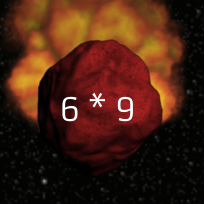
A red asteroid, be careful!
Creating Your Own Custom Flashcard Set
I also wanted to make sure that you could create your own flashcard sets to
study what you wanted with Astrocards. To create an Astrocards add a file the
the directory sets/ in the directory that contains the executable and follow
this format:
# This is a comment
"set_name" {
"question" = "answer";
}An example:
"math" {
# Addition
"1 + 1" = "2";
"2 + 3" = "5";
# Multiplication
"2 * 2" = "4";
"3 * 5" = "15";
}Conclusion
Overall, I would say that this was a fun small project to work on and I might make some small adjustments to it in the future although I do not intend to make any major updates to it.
If you think this sounds interesting, check out the github page here.
Anyway that’s it, have a nice day!
Screenshots
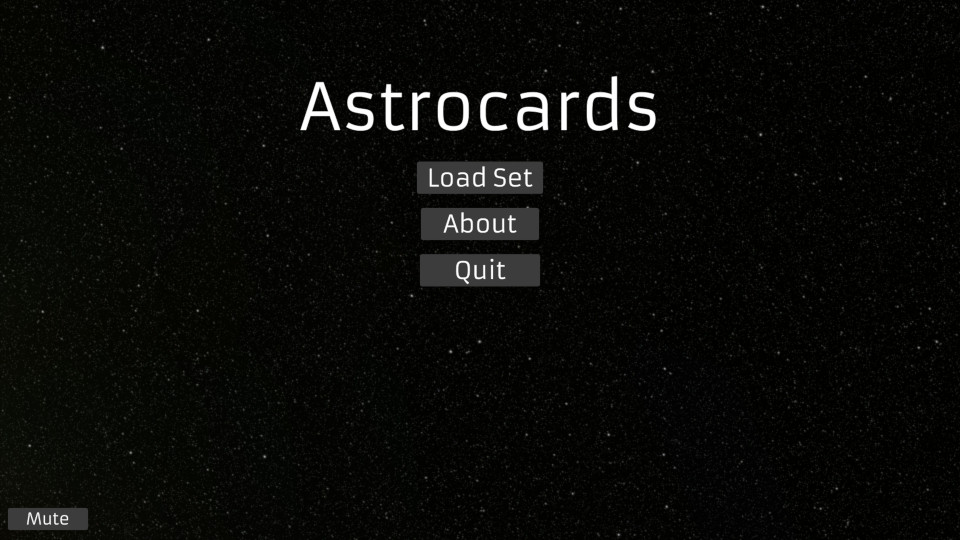
A screenshot of the main title.
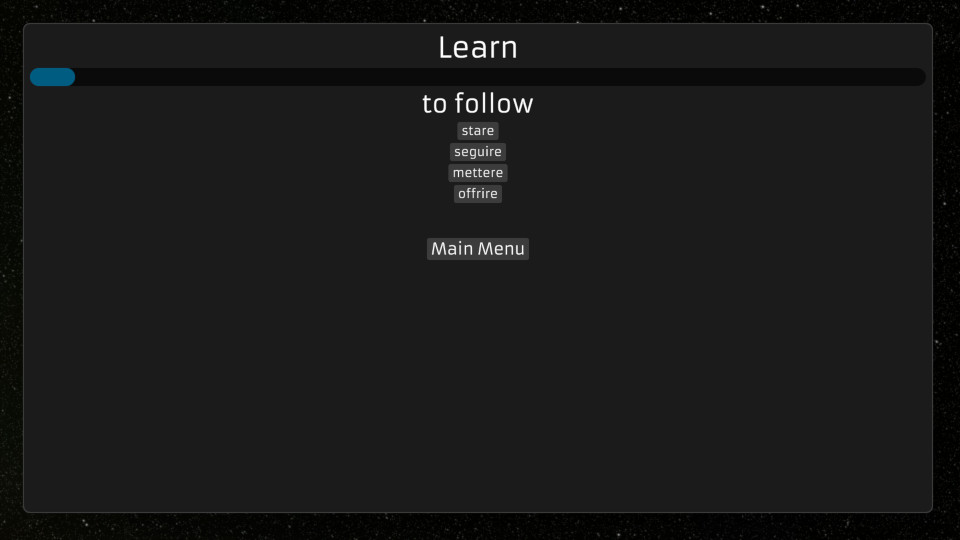
A screenshot from “learn mode”.
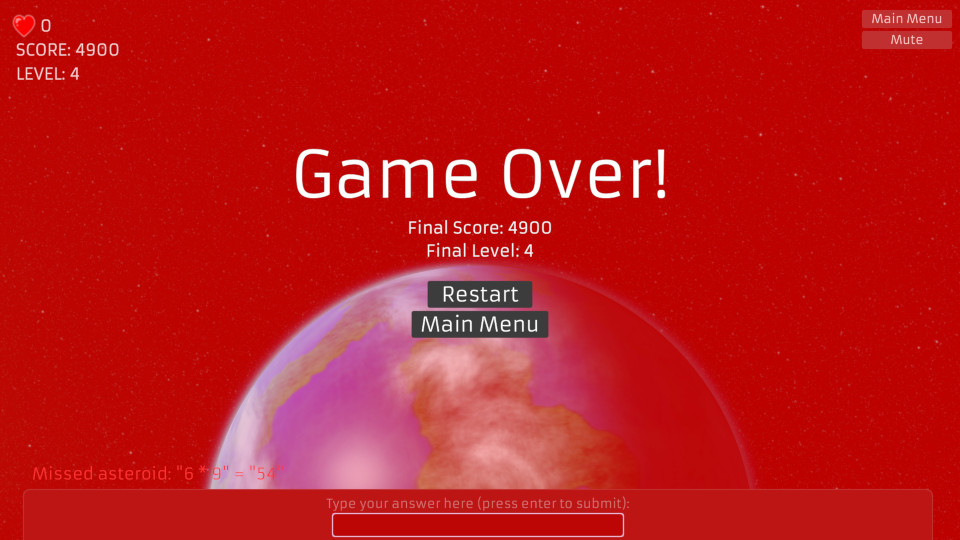
Game over!